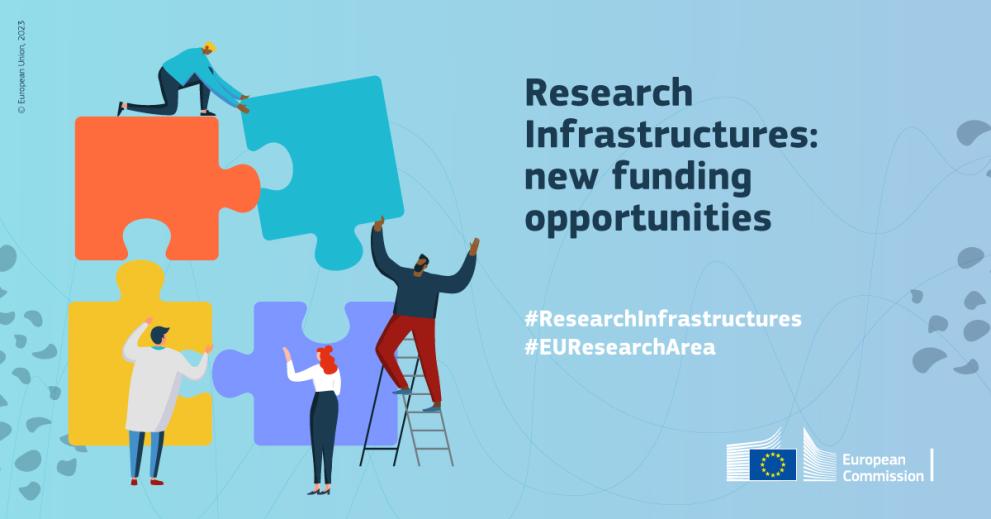
What are Research Infrastructures under Horizon Europe?
Research Infrastructures is one of the key components of the Excellence Science pillar under Horizon Europe. It aims to contribute to the consolidation and optimisation of an integrated ecosystem of national and pan-European research infrastructures, which help covering the continuum of needs from fundamental knowledge creation to technology deployment and support the implementation of Open Science policies as well as European technology leadership.
Research Infrastructures include access to customised, multidisciplinary, and impact-oriented research laboratories, scientific instrumentation and technologies, data resources (such as collections or archives), computational tools and communication networks.
Research Infrastructures address important current challenges in health, supporting the transition towards a green and digital future and the development of ground-breaking technologies.
New calls for proposals
The new calls for proposals opened on 6 December 2023, with the overall budget of €221.5 million, spread over three destinations. Each destination has its own focus, covering diverse topics.
The Developing, consolidating and optimising the European research infrastructures landscape, maintaining global leadership (INFRADEV) destination touches upon the following topics:
- Consolidation of the research infrastructures landscape – Individual support for evolution and long-term sustainability of pan-European research infrastructures;
- Research infrastructure concept development;
- Strengthen the bilateral cooperation on research infrastructures with Africa.
The Enabling an operational, open and FAIR (Findability, Accessibility, Interoperability, and Reusability) EOSC (European Open Science Cloud) ecosystem (INFRAEOSC) destination has the following topics:
- FAIR and open data sharing in support of the mission adaptation to climate change;
- Supporting the EOSC Partnership in further consolidating the coordination and sustainability of the EOSC ecosystem;
- Enabling a network of EOSC federated and trustworthy repositories and enhancing the framework of generic and discipline specific services for data and other research digital objects;
- Long-term access and preservation infrastructure development for EOSC, including data quality aspects;
- Innovative and customizable services for EOSC Exchange.
The Next generation of scientific instrumentation, tools and methods and advanced digital solutions (INFRATECH) destination is funding topics such as:
- R&D (research and development) for the next generation of scientific instrumentation, tools, methods, solutions for Research Infrastructures upgrade;
- Development of tools, solutions, modules to enable R&I on the social aspects of the green transition;
- New digital twins for Destination Earth;
- AR/VR-empowered digital twins for modelling complex phenomena in new Research Infrastructures application areas.
The calls for proposals are open to researchers from Europe and beyond, ready to foster ground-breaking innovation for the benefit of citizens and society. The deadline for applying is 12 March 2024.
Learn more by consulting the Horizon Europe Work Programme 2023-2024 and watching the Info Day recording.
Submit your project proposal via the Funding and Tenders portal.
The 2022 Research Infrastructure calls for proposals
Last year’s calls received a total of 93 submitted applications for all four destinations. After expert independent evaluations, 50 proposals were selected for funding, of which:
- 26 projects signed their grant agreement following the INFRADEV call, with an indicative budget of €70.34 million.
- 7 projects signed their grant agreement following the INFRAEOSC call, with an indicative budget of €65.76 million.
- 13 projects signed their grant agreement following the INFRASERV call, with an indicative budget of €160.1 million.
- 4 projects signed their grant agreement following the INFRATECH call, with an indicative budget of €19.9 million.
Research Infrastructures success stories
ARIES - Accelerator Research and Innovation for European Science and Society
Particle accelerators do much more than smash atoms together. To sustainably meet their wide-ranging potential, the EU-funded ARIES project is finding way to make them more compact and energy-efficient. It facilitates a smooth collaboration between accelerator laboratories, technology institutes, universities and industrial partners, specialised in high-energy physics, as well as in photon and neutron science.
INTERACT - International Network for Terrestrial Research and Monitoring in the Arctic
Climate change in the Arctic has global implications, and requires a coordinated, global response. The EU-funded INTERACT project is supporting international cooperation in the polar region, with 64 partners and 88 research stations, hosting more than 5000 researchers per year.
EVA-GLOBAL - European Virus Archive GLOBAL
Researchers working on the EU-funded EVA-GLOBAL project have created the first global virus collection. The repository will support scientific research and help us respond to future outbreaks. The project gathers 43 laboratories associated with key Non-Governmental Organizations, including the World Health Organisation.
EOSC4Cancer - A European-wide foundation to accelerate Data-driven Cancer Research
The EOSC4Cancer project aims to establish a pan European infrastructure that integrates cancer research-related data and makes it accessible for analysis across borders, leading to more productive research collaboration and innovative therapies for patients.
Interested in more success stories about Research Infrastructures? Read the recently published CORDIS Results Pack.
Would you like to work as an expert for Research Infrastructures?
The European Research Executive Agency invites experts from a wide range of fields to register in the European Commission’s expert's database. From this database, we select candidates with the most suitable profile for evaluating projects and monitoring their implementation.
Find out more about becoming an evaluator, which profiles are of interest and how to register: Work as an expert.
Details
- Publication date
- 5 December 2023
- Author
- European Research Executive Agency
